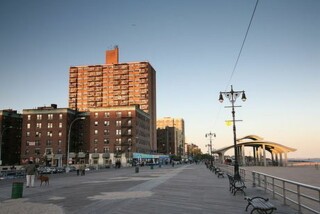In Brighton Beach
Peter Pomerantsev
The immigrant who arrives too late in life to adapt to his new country, but too early to survive on nostalgia for the old country, has to create a third, imagined country to live in. When my grandmother got Alzheimer’s I was tempted to see it as an expression of her late-life immigration from the USSR to the USA, leaving one civilisation and never arriving at the other. (I was a teenager.) One of her daughters had cut off her past and been reborn as an American; the other returned over and over to Russia, making documentaries, unearthing graves and exploring gulags so she was all ‘memory’. But my grandmother had neither future nor past. As her illness got worse she would be found walking dazed along the boardwalk in Brighton Beach, the Russian ghetto where Brooklyn meets the ocean, a last stop on the subway from Manhattan. In the evening the boardwalk would be full of Russian immigrants with gaudy haircuts and fur-wrap finery, and as the light faded you could forget you were in America.
Visiting Brighton Beach the other week I was told the story of Lev, an unemployed electrician, who fell in love with a Wasp. It was 1982. He was in his late forties, had been in the US for four years but still spoke no English. He would rarely venture outside Brighton Beach, but once travelled all the way to New Jersey to see friends of friends. On the train back to the city a blonde woman sat down next to him. He noticed her haircut first: shaved at the back with a Siouxsie Sioux spiked mop on top. He couldn’t stop staring at it.
Lev was carrying a copy of Syntaksis, the émigré intellectual journal published in Paris. He didn’t usually read it, but had grabbed it to have something on the train. The woman saw it and addressed him in good Russian. She told him she was writing a PhD on contemporary Soviet dissident poetry at Columbia. Her name was Ashley Vandersomething.
He told her he was a dissident, recently arrived. This was a lie: he’d got out on a Jewish quota and didn’t have strong political beliefs. Later, he would tell friends he’d lied as a self-defence mechanism: the immigrant is always on the look out for traps. But deep down he also knew that saying you were a Soviet dissident gave you a certain glamour. He also didn’t mention that he was married to Rosa, who washed hair at the salon on the corner of Brighton Beach Avenue and 8th. And with whom he had several children.
Ashley and Lev met several times in the City. He would tell her stories about being arrested by the KGB (adapted from stories told to him by real dissidents) and Ashley let him touch her up in Central Park. He loved running his hand along the back of her head where the hair was shaved short. For the first time he felt he had truly arrived in America. He fell in love.
After a few dates Ashley told him she wanted to come to Brighton Beach. He couldn’t avoid the subject for ever and eventually had to agree.
He was nervous when she arrived. He felt he couldn’t lie any more. He wanted her to love him for himself. As soon as Ashley came down the stairs from the subway, which rattles across a bridge over Brighton Beach Avenue, it all came tumbling out: who he really was and that he was married. Every time a train passed overhead it drowned out what he was saying and he would have start over.
Ashley asked to see where he lived. He took her to the small apartment he shared with Rosa. As soon as Ashley walked in she knew she never wanted to see Lev again: kitsch chocolate box covers cut out and hung on the wall; the worn, fake-leather slippers (tapochki) still warm from other people’s feet which all guests had to wear.
After Ashley left, Lev tried to leave messages for her at Columbia but she never replied. He would wait for her outside Columbia but then lose courage and take the subway home.
Rosa could see he was sad and asked him what was wrong. Could she help? He mumbled something about needing to reignite their relationship. Then he had an idea. He told Rosa it might help their marriage if she changed her look. He described a Brighton Beach version of Ashley’s haircut. Rosa gave it a try: bleached her hair, shaved the back. Women visiting the hairdresser where Rosa worked noticed the haircut and liked it. Could they have one too? Rosa said the haircut had been her husband’s idea and it became known as the Lev. More and more women wanted it. It became the look in Brighton Beach in 1982.
In the evenings, Lev would stroll along the Boardwalk, surrounded by women with Ashley’s haircut. Walking behind someone the right height and build, he could imagine it was Ashley herself, until she turned round. He knew he hadn’t made it to the real America, but he had brought something of America to Brighton Beach. A self-made America. That was almost enough.

Comments